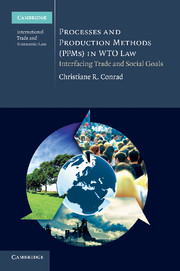Book contents
- Frontmatter
- Contents
- List of figures and tables
- Preface and acknowledgements
- Table of GATT 1947 Reports
- Table of WTO Reports
- List of abbreviations
- Introduction
- I Foundations: the relevance of NPA measures at the interface of domestic regulation, economic globalization and world trade law
- II Legal analysis: reviewing the status of NPA measures de lege lata
- III Outlook: new perspectives on the legal status of NPA measures
- Summary and concluding remarks
- Bibliography
- Index
Preface and acknowledgements
Published online by Cambridge University Press: 05 June 2011
- Frontmatter
- Contents
- List of figures and tables
- Preface and acknowledgements
- Table of GATT 1947 Reports
- Table of WTO Reports
- List of abbreviations
- Introduction
- I Foundations: the relevance of NPA measures at the interface of domestic regulation, economic globalization and world trade law
- II Legal analysis: reviewing the status of NPA measures de lege lata
- III Outlook: new perspectives on the legal status of NPA measures
- Summary and concluding remarks
- Bibliography
- Index
Summary
This book is a revised and updated version of my Ph.D. dissertation, which was accepted by the Law Faculty of the University of Berne in 2008. The sub-title of my dissertation, ‘A contribution to the debate on the impact of WTO law on national regulation pursuing social goals’, shows the broader context of my doctoral research which led to this book. As a member of the project group ‘Social regulation and world trade’ at the Collaborative Research Centre ‘Transformations of the State’, I placed a strong focus on the interplay of national social regulation and international trade, and, in particular, on the status of national regulatory measures under the law of the WTO. I found that despite a decades-long debate, the status of such measures – both from a legal and a political perspective – still remains unresolved. Existing regulatory measures show, that despite legal uncertainty, states do not totally refrain from exercising their power to enact such measures. However, there can be no doubt that the existence of the WTO Agreements and the heated legal and political debates on the legality of certain measures of national social regulation, which have been taking place at an international and, above all, at a transnational level, may lead to a chilling effect on the exercise of national powers. These, however, are still necessary to solve certain problems in cases where no capable institutions at other governance levels are in place.
- Type
- Chapter
- Information
- Processes and Production Methods (PPMs) in WTO LawInterfacing Trade and Social Goals, pp. xvii - xviiiPublisher: Cambridge University PressPrint publication year: 2011



